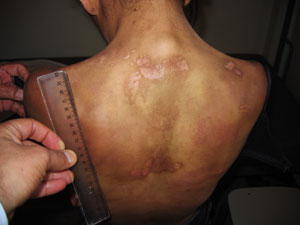
Aneesa was hit, kicked, burnt with an iron, scalded and left naked in the cold.
Credits: Caritas Lebanon
Aneesa*, 23, arrived in Lebanon during the 2006 war with Israel. She left her home in the Philippines to become a domestic worker with a family. With battles being fought on the streets of Beirut, Aneesa was very afraid and wanted to go back home after just two weeks.
It was too difficult to leave so Aneesa had to stay with the family that had been assigned to her by an agency. Very soon, her concerns about the war outside dimmed in comparison to her own personal conflict, which saw her the victim of violence and abuses at the hands of her employers.
“The Mister slapped me and even touched me. He wanted to find out if I was a virgin and single. I begged him not to touch me, but he was very strong and I was frightened,” said Aneesa.
As time passed, the list of abuses grew longer. Aneesa was hit, kicked, burnt with an iron, scalded and left naked in the cold.
Her employers then decided to return her to the agency. They made Aneesa drink wine on the way there so she looked like a drunk. The agency gave her something to eat and made her rest but they refused to take her back and made her return to the family.
“That evening they stabbed me with a plastic fork and used a rolling pin on my feet. The Mister tried to strangle me too,” said Aneesa.
Fortunately for Aneesa, the agency informed the Caritas Lebanon Migrant Centre about the abuses. They in turn informed the General Prosecutor who launched an investigation into the family.
Aneesa was taken to hospital with second and third degree burns. Caritas took her to a safe house on her discharge and helped her file a law suit against her employers for gross mistreatment and to claim for unpaid wages.
Caritas provided Aneesa with food, clothing, medical assistance, counselling, legal aid and general support so she could overcome her abuses. Caritas is still following up the complaint against her employers, but Aneesa has now returned to the Philippines. Caritas gave her a seed grant so she could start a small income-generating business.
Figures from the Lebanese Government show there were almost 88,000 documented migrants working as housemaids in the country in 2007.
The Government has set up two steering committees to protect rights and raise awareness among migrants, employers and agencies to ensure fair treatment.
The Caritas Lebanon Migrant Centre also leads awareness raising campaigns and encourages exploited migrants to seek assistance. It urges people who know of abusive situations to phone one of their 24-hour hotlines.
Centre Director Najla Chahda says they have seen a positive change in people’s behaviour following the campaigns and they now receive migrants referred by a variety of sources.
The centre aims to improve living and working conditions for migrants, reduce exploitation and marginalisation, defend migrants and raise awareness both among migrants and refugees and in the host country.
Apart from an array of services such as the ones which helped Aneesa, the centre has undertaken a variety of projects. These include supporting Iraqi refugees in Lebanon, assisting elderly Palestinian refugees and organising summer camps and schooling for migrants’ children. The centre has also been active in peace building and trying to break down situations of injustice.
The centre is working hard to ensure that cases like that of Aneesa become fewer and fewer and that migrants and refugees feel safe and are allowed to prosper without fear or intimidation in their chosen land of Lebanon.
“We believe that there is a lot still to be done in terms of providing a competent protection for migrant workers in Lebanon,” says Ms Chahda, “but one has to acknowledge all the efforts deployed by the Lebanese Government to address this issue in the fairest way.”
*Name changed to protect identity
